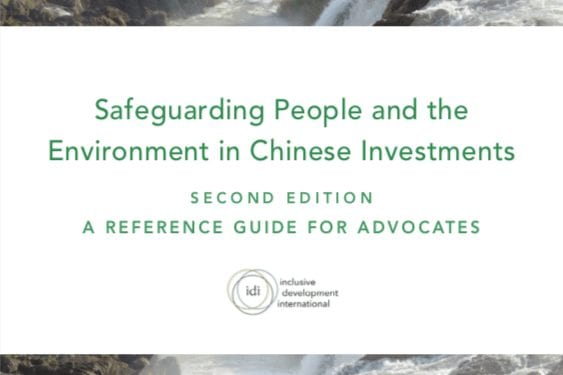Inclusive Development International is pleased to announce the publication of a second edition of Safeguarding People and the Environment in Chinese Investments: A Reference Guide for Advocates. This publication provides a practical guide to the policies, standards and guidelines for Chinese outbound investment.
The updated guide builds on our 2017 edition, adding new details on the Belt and Road Initiative, China’s new vision for enhancing global connectivity, along with updates to administrative guidance from China’s central state agencies on outbound investment. It also covers new guidelines on rubber, agriculture, infrastructure projects and more. The guide explains the key actors involved in Chinese overseas investment and describes the environmental and social standards and guidelines that apply. It provides practical tips on how these standards can be used in advocacy with relevant Chinese actors and institutions.
China has become one of the world’s most important sources of foreign direct investment and development finance. Chinese companies are active across the project cycle, from research and design, to construction, development and operation. Many overseas development projects would not be possible without the billions of dollars Chinese financial institutions provide each year in loans, risk guarantees and equity investments.
“This investment brings with it potential benefits, but also significant human rights, social and environmental risks,” said Mark Grimsditch, Inclusive Development International’s China Global Program Director.
“Communities impacted by Chinese investments, and the civil society groups that seek to support them, often encounter difficulties obtaining project information, communicating with developers and financiers, and raising concerns or complaints.”
In response to bad publicity going back at least ten years, and challenges faced by companies operating overseas, Chinese state institutions and industry groups have developed a formidable body of policies and guidelines for Chinese companies developing, operating and financing overseas projects.
Despite the promulgation of new guidelines meant to promote sustainable development and prevent adverse impacts, China-based financiers and companies have continued to back development and investment projects across the world that have had devastating impacts on local communities and the environment.
While some of China’s policy developments show promise, the challenge now is to promote their implementation, and their eventual alignment with international human rights and environmental standards. This is more relevant than ever as China develops the concept of the Belt and Road. In April 2019, at the second Belt and Road Forum, Xi Jinping and leaders from around the world pledged to build high-quality, sustainable infrastructure, and to promote “green” development.
“Understanding the financial institutions, companies and state actors responsible for the oversight of China’s outbound investment is imperative if people on the receiving end of these investments are to hold these actors to their word, and have a say in the projects that affect them and the resources they depend upon,” said Grimsditch. “Inclusive Development International hopes that this resource will assist community advocates to put these standards to the test and ensure that the rights of people affected by Chinese investments are respected and protected.”
The guide can be downloaded here.
The policies, standards and guidelines covered in the guide are compiled on this page on our Following the Money to Justice online resource. New documents will be posted here as and when they are adopted.
Inclusive Development International would like to thank Heinrich-Böll-Stiftung South East Asia, The McKnight Foundation, Sigrid Rausing Trust and Planet Wheeler Foundation for supporting the research and development of these publications.


